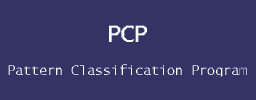
 |
|
This is a home page for PCP (Pattern Classification
Program). It is an open-source machine learning program for supervised
classification of patterns (vectors of measurements).
PCP implements the following algorithms and methods:
PCP distribution contains executables for Linux and Windows operating
systems (under Cygwin environment), on i386 architecture CPUs such as
Intel Pentium or AMD Athlon. PCP has been developed and tested on
Fedora Core 4 distribution. It has also been tested on
RedHat 9.0 and Windows XP/Cygwin.
An application note
describing PCP has been published in journal Bioinformatics.
PCP is licensed under MIT license (also known as X11 license), which
allows unrestricted use for any purpose. It uses five other software
packages, all of which are distributed under permissive licenses
consistent with the MIT license. See file LICENSING in the
distribution for more details.
Click
here to download PCP (choose the most recent release). Linux
users, download file with with extension .tar.gz and untar/gunzip the
downloaded file. Windows users, please download file with .zip
extension. After unpacking, the Linux executable pcp can be
found in Linux subdirectory, while the Windows/Cygwin executable pcp.exe is in
Cygwin subdirectory. Source code is in the src
subdirectory. Documentation, sample batch scripts, data sets
etc. are in the top-level directory.
To run the program under Windows, you must first download and install
the free Cygwin environment.
To install the program, copy the executable to any directory in your
PATH. After that, PCP can be started by typing
% pcp
at the command prompt. There are no configuration files or other
external settings for PCP.
The program can be compiled for other UNIX-like platforms by typing
% ./configure
PCP was written by Ljubomir
Buturovic of San Francisco State University.
Please send all comments and bug reports to
ljubomir@sfsu.edu.
1. As of release 2.2, PCP is no longer being developed.
2. PCP has a bug in model selection and cross-validation for
probabilistic SVM classifier. It produces incorrect results for
multiple experiments. Please use one experiment for probabilistic SVM
model selection and cross-validation.
This work has its origins in project PARIS, designed with Prof. Milan
Milosavljevic at the School of Electrical Engineering, University of
Belgrade, Serbia, with additional contributions by Dr. Milan Markovic,
Prof. Srdjan Stankovic and Prof. Mladen Veinovic.
Sasha Jaksic of San Francisco State University contributed code to the
feature selection functionality.
The author acknowledges and wishes to thank authors of the following
open-source software packages used in PCP:
Page last updated September 10, 2011
|